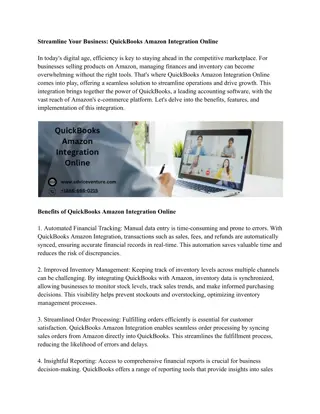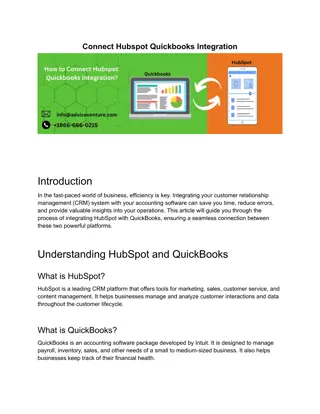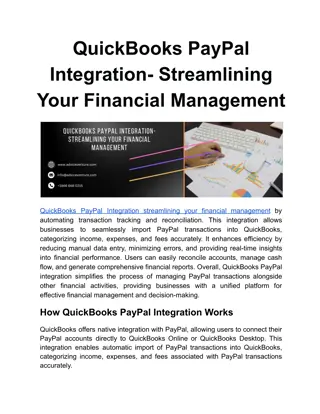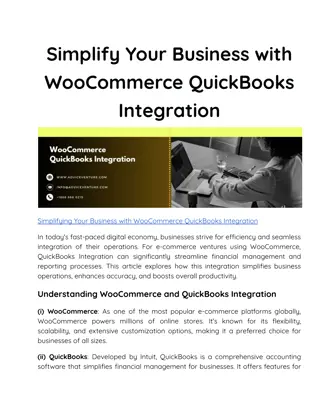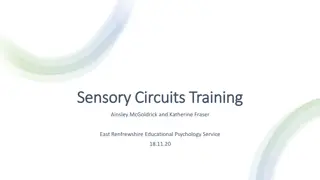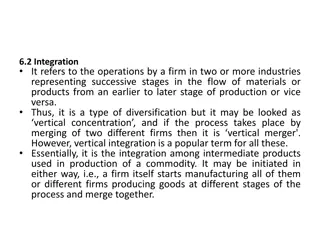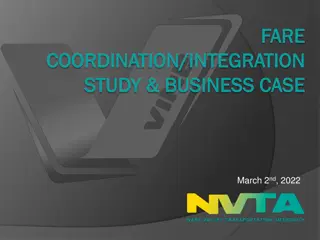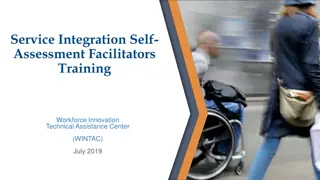
Work-Life Integration Challenges and Coping Strategies
Discover the challenges of work-life integration and effective coping mechanisms provided by experts in the field. From managing time and energy to finding balance between work and personal life, learn practical tips for enhancing your well-being and productivity.
Download Presentation

Please find below an Image/Link to download the presentation.
The content on the website is provided AS IS for your information and personal use only. It may not be sold, licensed, or shared on other websites without obtaining consent from the author. If you encounter any issues during the download, it is possible that the publisher has removed the file from their server.
You are allowed to download the files provided on this website for personal or commercial use, subject to the condition that they are used lawfully. All files are the property of their respective owners.
The content on the website is provided AS IS for your information and personal use only. It may not be sold, licensed, or shared on other websites without obtaining consent from the author.
E N D
Presentation Transcript
WORK-LIFE INTEGRATION: CHALLENGES & EFFECTIVE COPING Erica Duncan, MD Associate Professor
YOUR BIGGEST WORK-LIFE INTEGRATION CHALLENGES TIME and ENERGY Never enough to do it all as well as we wish Triage is key, both at work and at home Have to trim what is least crucial Soul searching to determine what time balance really is what you want. Then live with it with authenticity, without guilt
TIPS FOR COPING AT HOME WITH WORK-LIFE CHALLENGES If you need to work at home (which most of us do) Try to work during the time when you are most efficient and productive (early AM, late PM) Don t neglect your personal needs for sleep, exercise, decent food An academic career is a marathon run, not a sprint, so PACE YOURSELF Vacations (with family) are essential I find 2 weeks is 4 times better than 1 week for recuperation/renewal It is important to spend at least one family vacation per year totally off the grid Money spent on saving time is money well spent (house cleaner, prepared meals, yard help, etc) Family meal time is important for everybody, even if short
TIPS FOR COPING AT WORK WITH WORK-LIFE CHALLENGES Efficiency and triage are key Multi-tasking is NOT worth it: cognition is less efficient Get up and get little bits of exercise every hour or two (climbing stairs, fast walking). Even 5 mins can rejuvenate. Be mindful of time spent schmoozing. Some is necessary for workplace esprit de corps, but too much is too much. But it IS important to show up for significant work/social events Seek mentoring or peer advice if you have difficulty at your work setting Total work time doesn t have to be constant across child rearing years
WORK-LIFE INTEGRATION: CHALLENGES & EFFECTIVE COPING Dorian Lamis, PhD Assistant Professor
YOUR BIGGEST WORK-LIFE INTEGRATION CHALLENGES Not responding to work emails/calls at night and/or during the weekend Not being able to stop working on a project or manuscript when close to finished Taking on too many responsibilities
TIPS FOR COPING AT HOME WITH WORK-LIFE CHALLENGES Exercise and self-care Making specific time(s) to spend with spouse and/or children Remove access to internet/phone when spending time with spouse/children Do fun things (vacation, sports events, live music) with family/friends. Set dates and plan in advance Openly discuss these issues with spouse
TIPS FOR COPING AT WORK WITH WORK-LIFE CHALLENGES Set list of priorities with timelines Say no to tasks when you re not excited about them and/or there s no benefit Make sure your colleagues/supervisees are happy, which will be less stressful for you at work and home. Help others out when asked (they will return the favor) Ask for support if needed; discuss with mentor, colleague, or friend if overwhelmed Set boundaries Do not strive for perfectionism in everything; one thing at a time Find good collaborators, so you re not left with the majority of the work
WORK-LIFE INTEGRATION: CHALLENGES & EFFECTIVE COPING Jennifer Holton, MD Assistant Professor
YOUR BIGGEST WORK-LIFE INTEGRATION CHALLENGES Roles and Responsibilities Clinical Work Administrative Work Research Career Development / Planning Family - Parent, Wife, Daughter, Sister Friends Hobbies/Interests Self-Care
TIPS FOR COPING AT HOME WITH WORK-LIFE CHALLENGES Supportive family / friends; good communication; nourish these relationships Identify your interests, values, goals (especially in comparison to how you are spending your time) Prioritize / plan / schedule Don t forget about self-care and things that will rejuvenate you and potentially help you be more efficient Find ways to get help with tasks that do not bring joy / satisfaction and let go of the control over these things Let go of others expectations and be compassionate with yourself ( good enough is ok sometimes)
TIPS FOR COPING AT WORK WITH WORK-LIFE CHALLENGES Supportive leadership, colleagues Mentorship Keep in mind your interests/values/goals and how these align (or don t) with job expectations Prioritize, plan/organize, schedule (including phone/email) Utilize flexibility when possible and needed Delegate when appropriate Learn to say no while still being a team player and helping others Keep in mind the bigger picture / longer game
WORK-LIFE INTEGRATION: CHALLENGES & EFFECTIVE COPING Jennifer Felger, PhD Assistant Professor
TIPS FOR COPING AT HOME WITH WORK-LIFE CHALLENGES Life (family, friends, household) Work Buying house and Grant due moving
YOUR BIGGEST WORK-LIFE INTEGRATION CHALLENGES Husbandunderstanding but still upset when entire weeks go by and I may only get to spend time with him at dinner Friends that I ve lost touch with over the years, or people who live here and I hardly see Family members not understand imbalance in work/pay ratio or why I have to do computer work over holidays Getting run down and tired, not feeling my best
TIPS FOR COPING AT WORK WITH WORK-LIFE CHALLENGES Being clear with my husband about what I can and cannot do, and letting him know when I plan to have free time reminding him about my travel plans Trying to at least on a yearly basis set aside time for correspondence with friends/family Talk to my family when I see them about what I m doing and its importance if they understand they appreciate it more Setting aside time just to focus on a work or house project Listening to my body and taking time to exercise or rest Respecting lives and personal time of colleagues and others in the department
WORK-LIFE INTEGRATION: CHALLENGES & EFFECTIVE COPING Sarah Brewer, MHA MBA Clinical Administrator, Brain Health Center Departments of Psychiatry and Behavioral Sciences, Neurology, Neurosurgery, Rehabilitation Medicine and the Sleep Center
YOUR BIGGEST WORK-LIFE INTEGRATION CHALLENGES TIME!! Massive email volume Fitting in important basics like sleep and exercise Missing out on being the parent/wife/friend Long days = exhaustion but no time for rest When work feels organized, home feels disorganized and vice versa. Constant pull of work (always plugged in) which means checked out of life activities
TIPS FOR COPING AT HOME WITH WORK-LIFE CHALLENGES Prioritize sleep Focus on work at work Weekends/evenings = family time; no work (put phone down when walking in the door) Find the time that works for you (e.g. early morning work before work means less impact on family) Make time for yourself either with kids/spouse or solo (running/yoga/etc) making sure to understand who you are and not to lose that Develop a network of friends/support to help (and ground) Use services (if possible/affordable) to do things that you don t need to (cleaning/shorten cooking, etc.) Intentionally develop/define/accept family role (with spouse) Check in with my extremely honest kids frequently Don t let work overtake life, but embed it in life in a positive/unobtrusive way
TIPS FOR COPING AT WORK WITH WORK-LIFE CHALLENGES Accept what I can and cannot do Prioritize what really needs you vs. what needs advice/guidance Develop and rely on an incredible team Keep work and life calendars/task lists electronic and together Model a good work life balance and try to create a good work life balance culture for staff Administrative time once a quarter Enjoy what you do (little things can help) Involve team/colleagues when something slows/stuck Prioritization/Organization Tips Project trackers, Evernote!!!, Calendar due dates/hold times for specific items, Outlook folder routing

